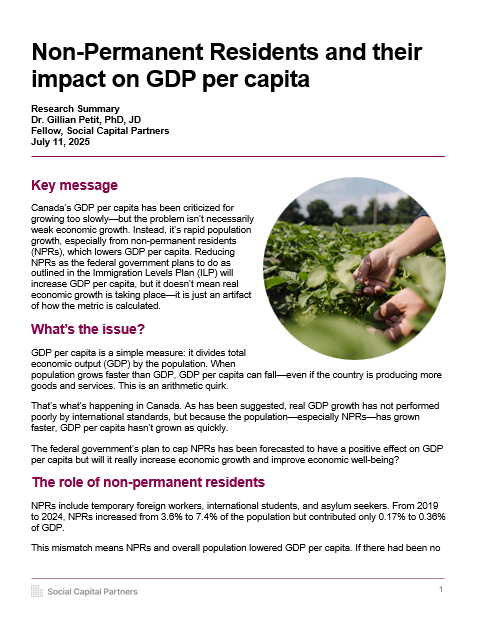New research from economist and SCP Fellow Gillian Petit, PhD, JD, explains why GDP per capita is a poor measure of economic performance and economic well-being. Using changes in GDP per capita as evidence of either improving or deteriorating economic well-being is poor economics, poor public policy and poor reasoning. Click here to read the full report.
Main messages
- The statistic “GDP per capita” has been used by some Canadian commentators as a summary measure to make sweeping claims about the state of the Canadian economy. However, this is misleading. Canada’s GDP per capita should not be used as if it were the sole indicator of economic well-being.
- Many conclude that low growth in GDP per capita over the past decade suggests that Canada’s economic growth has been low. But that is untrue. Canada’s economic growth has been on par or ahead of peer countries. Growth in GDP per capita, however, has been decreased by a high growth in temporary residents, like temporary foreign workers and international students. This is an arithmetic quirk of GDP per capita.
- This paper estimates what our GDP per capita growth would have been if Canada’s intake of temporary residents was more in line with recent historical norms. It also estimates the impact on GDP per capita growth in the coming years as a result simply of lowering our intake of temporary residents. Under both scenarios, Canada’s GDP per capita growth would have looked—and will look—very much like our peers.
Share with a friend
Related reading
Watch the video: Are foreign takeovers good for Canada’s economy?
We all want more investment in Canada's economy. But as SCP Chair Jon Shell explains in this video, when it comes to foreign investment in the Canadian economy, or FDI, we have to ask: is it investment that builds? Or investment that buys? Because these are two very different things.
Mark Carney’s Davos speech is a manifesto for the world’s middle powers
Mark Carney's recent speech at Davos matters because it treats this moment as a rupture, not a passing disruption. It’s in this rethink, write Matthew Mendelsohn and Jon Shell, that there is also relief: “From the fracture, we can build something better, stronger and more just,” Carney said. “This is the task of the middle powers.” The world's middle powers are not powerless, but we have been acting as if we are, living within the lie of mutual benefit with our outsized and increasingly erratic neighbour. Without the U.S., the world's middle-power democracies are rich, powerful and principled enough that we can unite to advance human well-being, prosperity and progress.
Four reasons our economy needs employee ownership now
Employee ownership offers a timely solution to some of Canada’s most pressing economic challenges, writes Deborah Aarts in Smith Business Insight. Evidence shows that when employees share ownership, businesses become more productive, innovative and resilient. Plus, beyond firm-level gains, employee ownership can help address the coming mass retirement of business owners, protect local economic sovereignty, boost national productivity and reduce wealth inequality. There is enough data about the brass-tacks benefits of employee ownership to sway even the most hardened skeptic.



